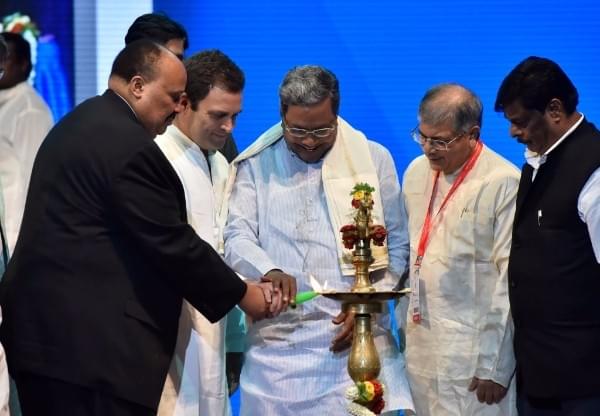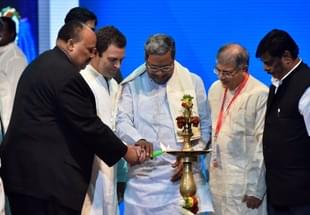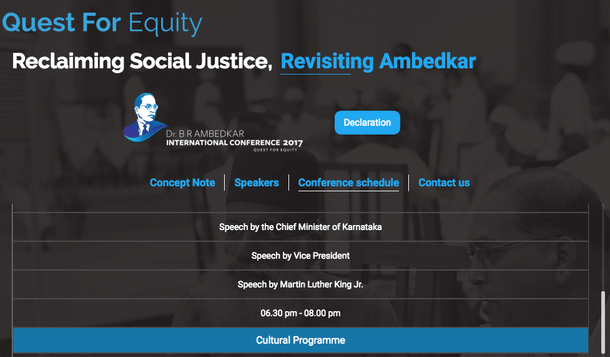Politics
A Congress Event In The Name Of A Conference, And Rs 20 Crore Of Taxpayers’ Money To Go With It
Surabhi Hodigere
Jul 26, 2017, 08:40 AM | Updated Jul 25, 2017, 08:59 PM IST
Save & read from anywhere!
Bookmark stories for easy access on any device or the Swarajya app.


Babasaheb Ambedkar’s place in Indian history would appear different depending on the vantage point. While the nation hailed him as the ‘father of the Indian Constitution’, his memory received no validation from the successive Congress-led governments at the centre. For the Nehru-Gandhi clan, awards, memorials and schemes to be named after came easy; Ambedkar on the other hand found no such honours. It took 34 years after his death for a Bharat Ratna to be conferred on him, and another 14 years had to pass before a small Ambedkar memorial was built in the national capital, both by non-Congress governments.
Now, as Prime Minister Narendra Modi seems to have taken it upon himself to honour Babasaheb’s legacy, the Congress party has woken up to the importance of embracing Ambedkar’s relevance in modern India.
This meta-project raises many questions, however.
And so does their attempt to do so through an international conference spearheaded by the Government of Karnataka (the only large state under Congress rule).
Conference, or a multi-day rally by another name?
At first glance, one must credit a renewed Congress team, especially in Karnataka, for leaving no stone unturned in ensuring that the conference comes across as a genuine exercise in forwarding social equity. Yet, the devil lies in the details. The website for the conference was launched on the 126th birth anniversary of B R Ambedkar, i.e., 14 April 2017, by none other than the Chairman of the Scheduled Castes Department of the All India Congress Committee, K Raju. The question that arises here and becomes all the more pertinent as we uncover other facts related to the conference is – was this a genuine attempt at an intellectual exercise by the Karnataka government or a political event of the All India Congress Party, including the state unit?
More fodder for the question comes from the list of speakers and the schedule of the conference. If this was indeed a platform to “re-think current social, political and economic paradigms motivated by Dr. B.R. Ambedkar’s imaginative and creative work”, why were the speakers invited based on their affiliation or allegiance to the Congress party? A look at the list of speakers shows us that apart from a panel on political power and social justice, which had politicians from other parties, most politicians at the conference were either former ministers or current Members of Parliament from the Congress party. From Shashi Tharoor to Mani Shankar Aiyar, Karnataka’s own Rajeev Gowda, to former minister K Rahman Khan – all found their place on one panel or the other.
It remains elusive as to why only politicians from the Congress party were found capable enough to deliberate on social justice at a government-organised conference.

What does the Karnataka government mean when it says ‘Vice President’?
Interestingly, the schedule for the event as published on the website shows that a ‘Vice President’ was to speak at the inaugural session. One would assume that considering this is a government-sponsored event, the reference is to the Vice President of the Union of India. Instead, it was Rahul Gandhi who spoke in that role during the inaugural session.
Gandhi, as we know, is the vice-president of the All India Congress Party.
Rs 20 crore of taxpayers’ money funded the entire event
The Minister for Public Works, Government of Karnataka, H C Mahadevappa has told the press that the event cost Rs 20 crore to host. Was taxpayers’ money to the tune of Rs 20 crore spent on a conference which mostly comes across as an initiative of the Congress party to claim the legacy of Ambedkar?
Karnataka is the only large state (in terms of area) under Congress rule. Unfortunately for the party, accusation of using government budgets to fund party activities has been levelled against it before as well; the steel flyover fiasco is just one example.
But why would the Congress party suddenly need to appropriate the legacy of Ambedkar?
To understand the importance of this question, it is necessary to look at the overall state of political affairs in the country. Although Ambedkar was a minister in Nehru’s cabinet, he was politically distrustful of the Indian National Congress. At the same time, Ambedkar was unsuccessful in electoral politics and therefore failed to provide a strong electoral alternative for the Dalits. With the rise of identity-based politics after the Mandal era, regional parties such as the Bahujan Samaj Party started garnering the majority of Dalit support, especially in the state of Uttar Pradesh. Yet the Congress retained the majority of Dalit votes nationally, until this trend was demolished in the 2014 Lok Sabha elections. Between 2009 and 2014, the Bharatiya Janata Party (BJP) grew from capturing just 12 per cent of the Dalit vote to 24 per cent. The next nationally decisive election was the Uttar Pradesh assembly election of 2017, where the BJP won the majority, including 69 of the 85 reserved assembly constituencies.
The Congress Party has suffered huge electoral losses across the country since the defeat of the second United Progressive Alliance government in 2014. Keeping in mind that their traditional vote bank is now changing its electoral behaviour, the Congress’ strategy to rebuild their pro-Dalit narrative becomes apparent.
This is where the timing of the conference is suspect. The country has seen manufactured demonstrations against the supposed intolerance of the Modi government. It is at such a time that furthering the perception of ‘we are with the oppressed’ becomes fruitful for an electorally desperate Congress Party. What better way to do so than to honour Ambedkar? Moreover, a glance at the list of speakers would prompt one to ask whether this endeavour was of the Congress alone, or driven by the entire left-liberal ecosystem of India.
This exercise also serves as a platform to subliminally instill fear in the minds of the citizenry about the supposed intolerance of the current government in the country. This is visible in the statements made by party leaders both before and during the conference.
At a time when divisive forces threaten the Idea of India,Confernce will see a coming together of all progressive forces in #QuestForEquity
— CM of Karnataka (@CMofKarnataka) July 8, 2017
Cryptic remarks such as “coming together of progressive forces” and “fight against fascist regressive forces” turned into statements drawing parallels between Narendra Modi and Adolf Hitler.
While inaugurating the conference in Bengaluru, Gandhi’s speech was a rant against the ruling government. He touched on issues relating to not just social justice but also demonetisation and the Rashtriya Swayamsevak Sangh’s idea of India. Over the course of the next two days, various speakers levelled similar criticism against the government, albeit between discussions on the topic concerning their panel. But the most alluding statement showcasing that the conference organised by the Government of Karnataka was actually a political tirade of the Congress came forth in the ‘New Deal’ or the ‘Bengaluru Declaration’ released at the valedictory programme.
The conclusion of the declaration read:
Regressive social and political forces have consistently resisted and tried to undermine both the constitutional idea of India and the efforts of the State in the last 70 years. These forces also seek to homogenise India and restore the principles of hierarchy, patriarchy and fundamentalism that Babasaheb Ambedkar, Jawaharlal Nehru, Jagjivan Ram, Vallabhai Patel, Maulana Azad and other founders rejected at the birth of the nation. Now that they enjoy State power, they are systematically dismantling the institutions that are the foundations of our society, by undermining India’s holistic welfare and affirmative action architecture and by destroying the pluralistic fabric of our nation. This poses a grave threat to the idea of India espoused by the freedom movement and spelt out in the Constitution.
We need to address these concerns urgently, and resist these attacks boldly. India needs to return to its noblest ideals, the spirit of its Constitution. It is time for the Indian people to recognise the constitutional path we chose 70 years ago and dedicate ourselves to protect and enhance this legacy. In this quest, the Bengaluru Declaration hopes that all progressive forces, collectively and across party lines, will adopt and implement these recommendations to fulfil Babasaheb Ambedkar’s dream of an equitable, just and egalitarian society.
Eyewash of an event can’t alter history
The Congress party’s interest in Ambedkar has only seen a beginning; with its dwindling electoral success and the meteoric rise of the BJP, the Congress is in desperate search for new icons to celebrate and new narratives to build. It is not something that has never been achieved before, as all political parties have to go through similar grinds in the pendulum of power. But the irony is not lost on anyone. In his life, Ambedkar viewed the Indian National Congress party as being dishonest with the marginalised and the downtrodden.
Having led the Untouchables against the Congress for full five years in the Round Table Conference and in the Joint Parliamentary Committee, I could not pretend to be unaffected by the results of the Elections. To me the question was: Had the Untouchables gone over to the Congress? Such a thing was to me unimaginable. For, I could not believe that the Untouchables—apart from a few agents of the Congress who are always tempted by the Congress gold to play the part of the traitor—could think of going over to the Congress en masse forgetting how Mr. Gandhi and the Congress opposed, inch by inch up to the very last moment, every one of their demands for political safeguards.What Gandhi and Congress have done to the Untouchables, 1945
And yet, the Congress party claims to be not just the rightful inheritor of Ambedkar’s legacy but also the political entity that is most capable of empowering the least empowered. Yes, the irony is not lost.
Surabhi Hodigere is the CEO Political Quotient Consultants Pvt. Ltd. She is passionate about politics, entrepreneurship, economics and all things spiritual.





